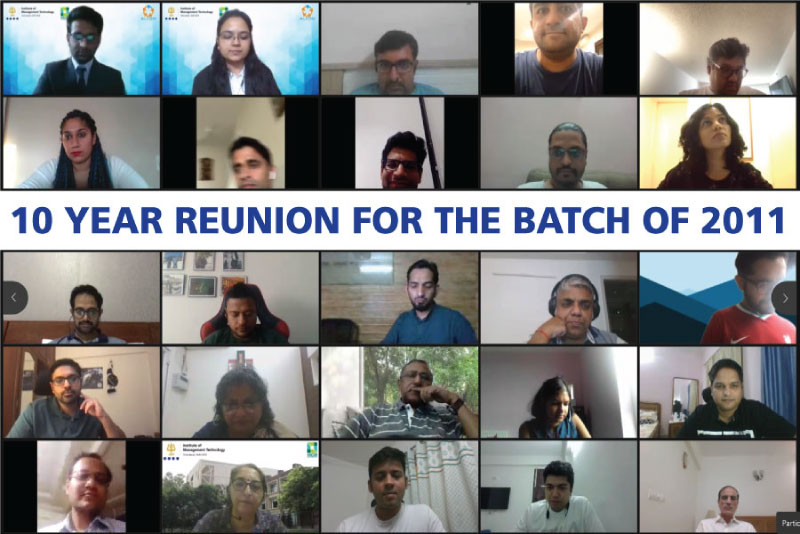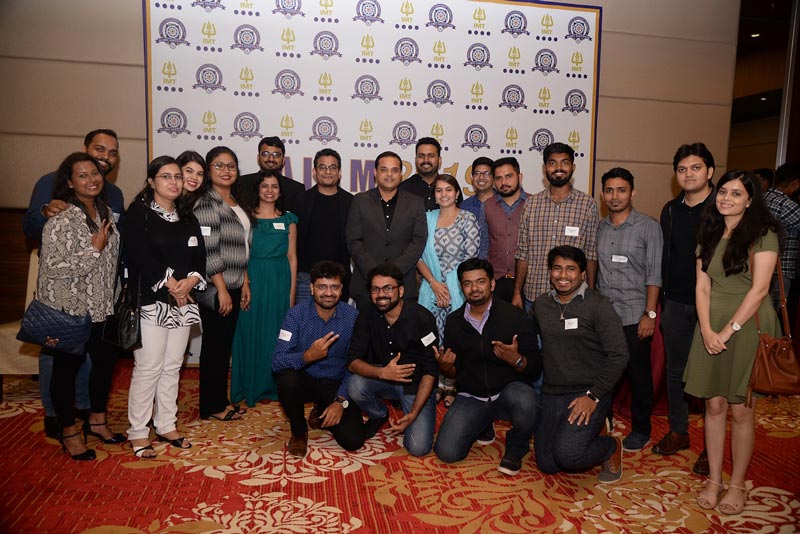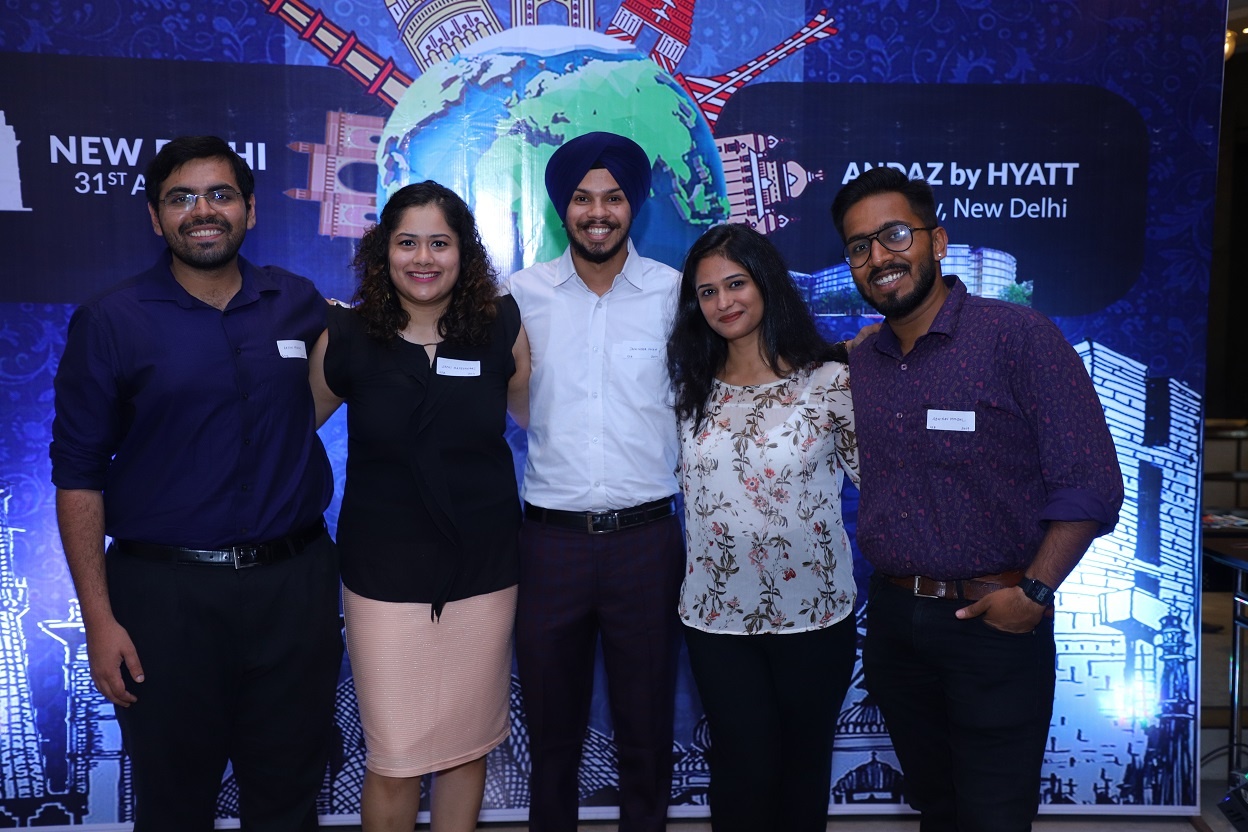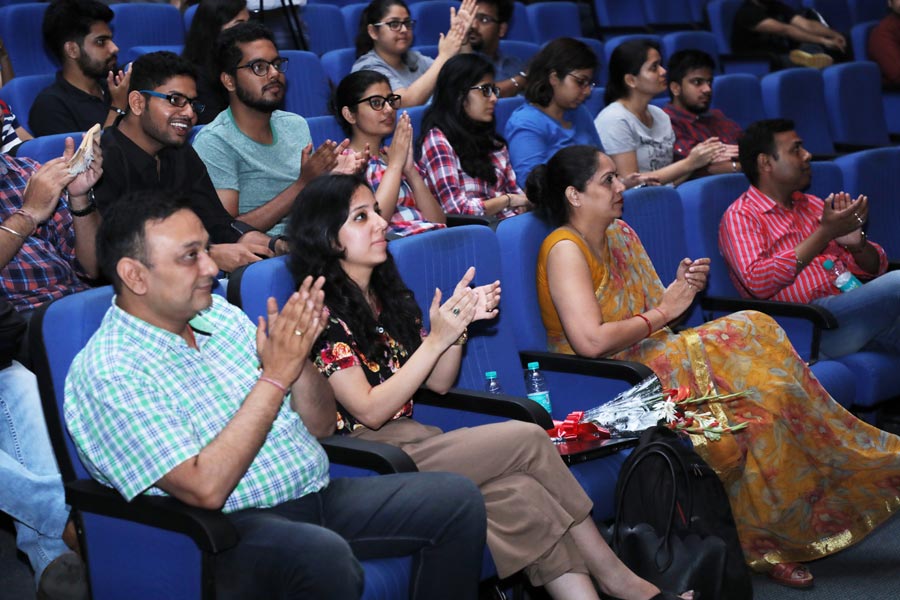Alumni Events

2011 Batch Reunion 2021
July 31, 2021 | Online

All India Alumni Meets 2019
Sept 14, 2019 | Bangalore

All India Alumni Meets 2019
August 31, 2019 | Delhi

Foundation Program 2018-20
June 09, 2018 | IMT Ghaziabad
Alumni Highlights
Syed Adil Umair (2014 PGDM Executive Program, IMT Ghaziabad) Co-founder QRx, launched Saral Test kit – RT LAMP-based technology. Qrx is one of the two firms that has been chosen by the Indian Council of Medical Research (ICMR) to produce and expand this test across the country.
Agragesh Ramani (2016 PGDM-Full Time Program, IMT Ghaziabad) Co-founder & CEO Acrannolife, launched CoviQwik kit – RT LAMP-based test. AcrannoLife Genomics is one of the two firms that has been chosen by the Indian Council of Medical Research (ICMR) to produce and expand this test across the country.
Our esteemed alumnus of 1985 batch , Mr. Sanjeev Bhatt, CEO Radico Fashion PVT Ltd has been awarded as the Indian Achievers Award 2020. Mr. Bhatt started his own business in 1992 with almost zero money, and at that time, he was just a simple man next door and not financially rich and free. A simple down to earth person. Motivational visiting speaker to various MBA Institutes and Colleges.
Testimonials
Parminder has 26 years of General Managerial experience in Strategy, Business Development, Marketing, Sales & Operations across 7 Industry Verticals, 3 continents and 4 organizations. The last 19 years of which are with Shell.
Read More
He is currently Vice President Europe & Africa for Shell Lubricants business accountable for delivering the bottom-line of the business in 70 countries within the region. He has recently been promoted as Senior Vice President EMEA (designate) for Shell Lubricants w.e.f July 2021. One of the top 120 leaders of Shell group which has a revenue of $345 billion and 83000 employees.
He has a track record in turning around underperforming businesses by building strong cohesive teams, attracting diverse talents and a high performance culture. He passionate about diversity in workplace.
He enjoys coaching and mentoring young entrepreneurs and was also a Non-Executive Director for Success For All Educational Trust which runs 3 secondary schools in London Borough of Havering between 2018-20.
Parminder completed his Advanced Management Programme for Harvard Business School, MBA from IMD Switzerland, Post Graduate Diploma in Business Management from IMT in India and a degree in Civil Engineering from Gujarat University in India. A physical and mental fitness enthusiast he enjoys distance running, yoga and meditation. He is also a keen traveller having been to more than 80 countries.
R Mahalakshmi is Director- Human Resources at Mondelez India (a company known for its brands like Cadbury’s, Tang, Bournvita, Oreo and more) She is a member of their Asia Middle East & Africa HR Leadership Team and the India Country Leadership Team. Over the last five years she has been at the heart of enabling the Turnaround for Mondelez India: embedding a winning growth culture, and defining the talent strategy to propel growth.
Read More...
“It all began at very young age with a simple act of sharing the toys to children who was living in nearby slum areas. I made sure to carry my humbling experience. For the very reason, after working in the corporate world for 7 years, I decided to leave my job and work on The Toy Bank full time.”
Read More
I started ‘The Toy Bank’ with one collection center in one city. I soon realized that people were not comfortable with the idea of ferrying toys to the collection center. To solve this problem, I motivated volunteers to open a number of collection centers at their homes, retail shops, offices across Delhi–NCR. With motivated volunteers, cost-effective collection centers and sharp marketing acumen of our team; thousands of old toys were received, refurbished, recycled and distributed. Taking resources from one person and then handing it out to another is one of the creative methodologies that we have adopted in The Toy Bank. We have sensitized over 1.5 lakhs children across 85 private schools to donate their old toys.
Even though I initiated The Toy Bank with the notion of distributing the toys to underserved children, later we realized that giving one toy to each child is not creating the desired impact. It was then the decision of creating a community resource was taken. Toy Libraries – which were also gender neutral – were created for the children to come and play together in a common space which would lead them to imbibe the values of sharing. It also gives the children the freedom to choose and play with what they want.
There was a time when we started questioning our work, whether it is making any impact? But every day we receive calls from individuals thanking us for frictionless delivery of toy kits, the learnings children get from the toys, and for keeping kids more involved in the classes/ anganwadis and in turn help in increasing their attendance and reducing the drop-out rates. The joy we hear in their voices and smiles shared by kids is heartwarming every single day. It’s what’s keep us going despite various challenges we face. It has also been a great learning curve for me every single day. We have signed Memorandum of Understanding (MOU) with various State governments for setting up Toy Libraries in Angadwadis and schools; have donated toys to Panchayat Ghars in rural areas; also created Toy Libraries for children with psycho-social disabilities and visual impairment; have tied up with innumerous non-profit in other states. We have expanded to 25 states/ UTs in India where we have set up 4,883 toy libraries for half a million children underprivileged child in accordance with the demographics of the children with help from a 100+ committed team from various walks of life.
However, there are more than 470 million children in India whose life we can positively influence by leading systemic change at a much larger scale. There are many constitutional and policy provisions for early childhood education but the challenges of implementation remain huge. My work in the corporate sector and the nonprofit sector has led me to the conclusion that there is a serious gap between policy formation and implementation which needs to be addressed at the earliest. This is where the private sector will prove to be the key to development in India, but without the government policies driving the development agenda and the social sector working at the grass root level, the vision we young Indians see for ourselves is likely to remain just that- a vision!
I believe that India is the most unique nation in the world with multiple layers of socio-economic diversity. Hence, there is bound to be challenges, setbacks and false starts. The challenges would be serious and many. They will not be met easily or met in a short span of time; but I want to work towards an India where they will be met.
